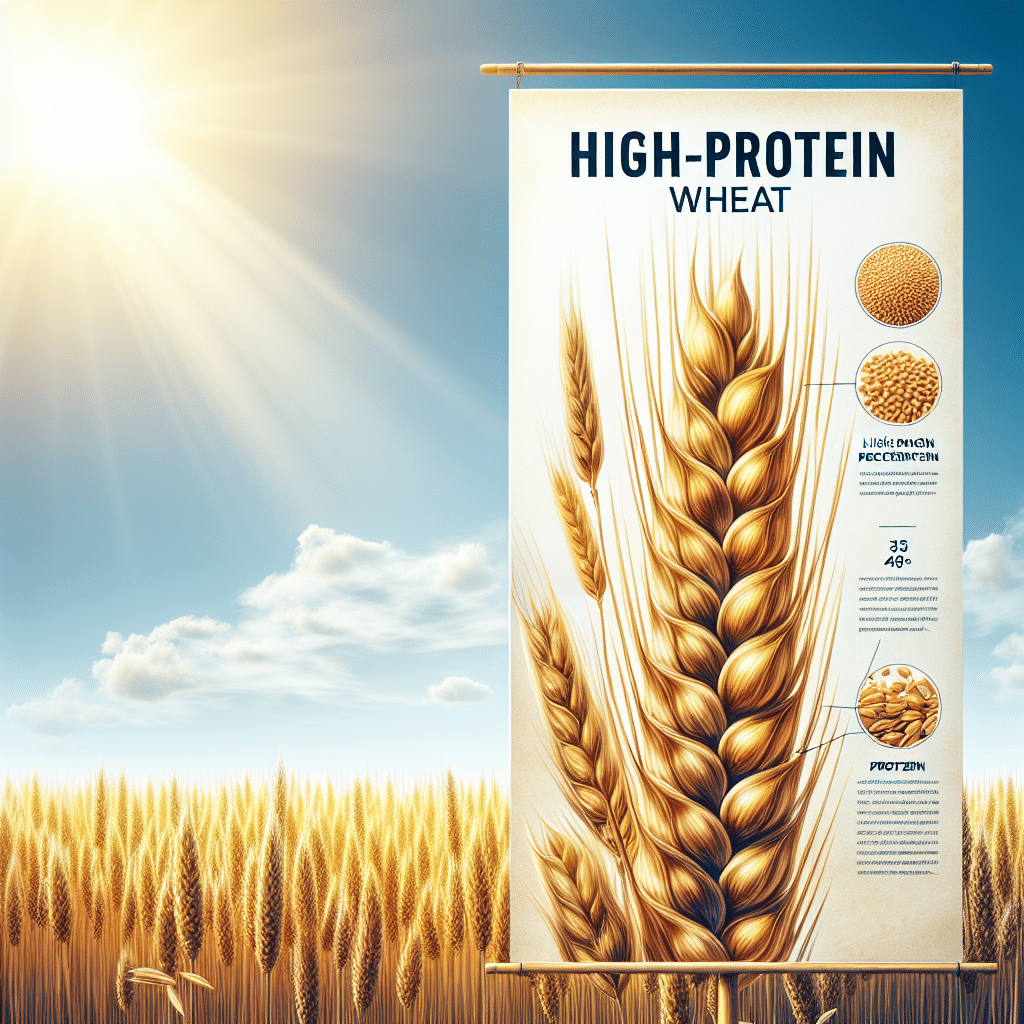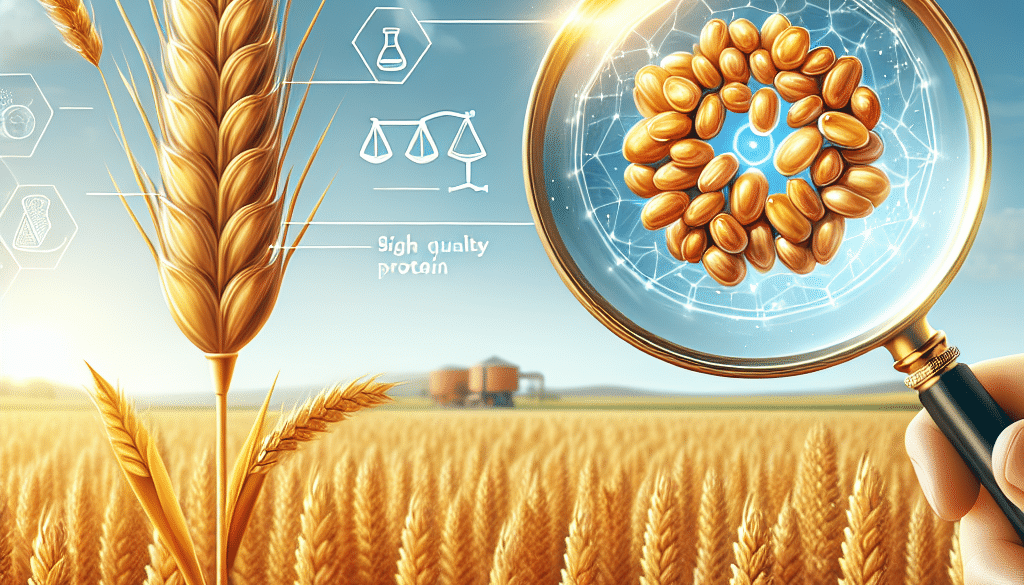What Is The Best High Protein Wheat?
-
Table of Contents
- High-Protein Wheat Varieties: Unveiling the Best Options for Nutritional Needs
- Understanding High-Protein Wheat
- The Nutritional Significance of High-Protein Wheat
- Top High-Protein Wheat Varieties
- Case Studies and Research on High-Protein Wheat
- Applications of High-Protein Wheat in Food Products
- Choosing the Best High-Protein Wheat
- Conclusion: The Superiority of High-Protein Wheat
- Discover ETprotein’s High-Quality Protein Products
High-Protein Wheat Varieties: Unveiling the Best Options for Nutritional Needs

Wheat is a staple food for a significant portion of the world’s population, providing a source of energy, fiber, and nutrients. However, not all wheat is created equal when it comes to protein content. High-protein wheat varieties are gaining attention for their potential health benefits and applications in food products. In this article, we will explore what constitutes the best high-protein wheat, examining its nutritional advantages, applications, and the leading varieties available in the market.
Understanding High-Protein Wheat
Protein content in wheat can vary significantly depending on the variety and growing conditions. High-protein wheat typically contains more than 14% protein, which is considerably higher than the average 9-12% found in common wheat varieties. The protein in wheat is primarily gluten, which is valued for its viscoelastic properties that are crucial for baking quality.
The Nutritional Significance of High-Protein Wheat
Protein is an essential macronutrient necessary for building and repairing tissues, making enzymes and hormones, and supporting overall health. High-protein wheat not only provides more protein per serving but also contains a better amino acid profile compared to lower-protein varieties. This makes it an attractive option for individuals looking to enhance their protein intake, especially vegetarians and vegans who may rely on plant-based sources of protein.
Top High-Protein Wheat Varieties
Several wheat varieties are known for their high protein content. Here are some of the most notable ones:
- Hard Red Spring Wheat: Known for its robust flavor and high protein content, often ranging from 13-15%. It is commonly used in bread making.
- Hard Red Winter Wheat: This variety has a slightly lower protein content than spring wheat but is still considered high-protein. It is versatile and used in a variety of baked goods.
- Hard White Wheat: While similar to hard red wheat in terms of protein, hard white wheat has a milder flavor and is preferred for whole wheat and high extraction flour applications.
- Durum Wheat: The hardest of all wheat, durum contains high protein and gluten strength, making it ideal for pasta and couscous.
Each of these varieties has its own unique characteristics and suitability for different food products.
Case Studies and Research on High-Protein Wheat
Research into high-protein wheat is ongoing, with studies focusing on breeding techniques, genetic modification, and agronomic practices to enhance protein content. For instance, a study published in the “Journal of Cereal Science” highlighted the development of high-protein wheat through traditional breeding methods, resulting in varieties that not only have increased protein levels but also improved amino acid profiles.
Another case study involves the use of biotechnology to increase the protein content of wheat. Genetic engineering has the potential to create wheat varieties with significantly higher protein levels while maintaining or improving other desirable traits such as yield and disease resistance.
Applications of High-Protein Wheat in Food Products
High-protein wheat is highly sought after in the food industry for various applications:
- Bakery Products: The high gluten strength is ideal for bread, rolls, and other baked goods that require structure and chewiness.
- Pasta: Durum wheat’s high protein content contributes to the firm texture of pasta upon cooking.
- Health Foods: High-protein wheat flour can be used in protein-enriched foods and snacks for health-conscious consumers.
- Plant-Based Protein Powders: Wheat protein isolates are used in protein powders and supplements for athletes and individuals looking to increase their protein intake.
The versatility of high-protein wheat makes it a valuable ingredient in a wide range of food products.
Choosing the Best High-Protein Wheat
Selecting the best high-protein wheat depends on the intended use and nutritional requirements. For baking, hard red spring wheat is often preferred for its high protein and strong gluten. For pasta, durum wheat is the top choice. Consumers looking for a milder taste and lighter color in whole wheat products might opt for hard white wheat.
It’s also important to consider the source of the wheat. Organically grown high-protein wheat can offer additional benefits, such as being free from synthetic pesticides and fertilizers.
Conclusion: The Superiority of High-Protein Wheat
In conclusion, high-protein wheat varieties offer significant nutritional advantages and are versatile in food applications. Whether it’s for baking, pasta making, or health foods, there is a high-protein wheat variety that meets the specific needs of both manufacturers and consumers. By understanding the different types of high-protein wheat and their applications, one can make informed decisions about incorporating these nutrient-dense grains into their diet or product line.
Discover ETprotein’s High-Quality Protein Products
If you’re looking for high-quality protein products, ETprotein offers a range of organic bulk vegan proteins that cater to various industries. Their products, including wheat protein isolates, are characterized by a neutral taste, non-GMO, and allergen-free attributes. With a commitment to purity and quality, ETprotein is a go-to source for your protein needs.
About ETprotein:
ETprotein, a reputable protein and L-(+)-Ergothioneine (EGT) Chinese factory manufacturer and supplier, is renowned for producing, stocking, exporting, and delivering the highest quality organic bulk vegan proteins and L-(+)-Ergothioneine. They include Organic rice protein, clear rice protein, pea protein, clear pea protein, watermelon seed protein, pumpkin seed protein, sunflower seed protein, mung bean protein, peanut protein, and L-(+)-Ergothioneine EGT Pharmaceutical grade, L-(+)-Ergothioneine EGT food grade, L-(+)-Ergothioneine EGT cosmetic grade, L-(+)-Ergothioneine EGT reference grade and L-(+)-Ergothioneine EGT standard. Their offerings, characterized by a neutral taste, non-GMO, allergen-free attributes, with L-(+)-Ergothioneine purity over 98%, 99%, cater to a diverse range of industries. They serve nutraceutical, pharmaceutical, cosmeceutical, veterinary, as well as food and beverage finished product distributors, traders, and manufacturers across Europe, USA, Canada, Australia, Thailand, Japan, Korea, Brazil, and Chile, among others.
ETprotein specialization includes exporting and delivering tailor-made protein powder and finished nutritional supplements. Their extensive product range covers sectors like Food and Beverage, Sports Nutrition, Weight Management, Dietary Supplements, Health and Wellness Products, and Infant Formula, ensuring comprehensive solutions to meet all your protein needs.
As a trusted company by leading global food and beverage brands and Fortune 500 companies, ETprotein reinforces China’s reputation in the global arena. For more information or to sample their products, please contact them and email sales(at)ETprotein.com today.












